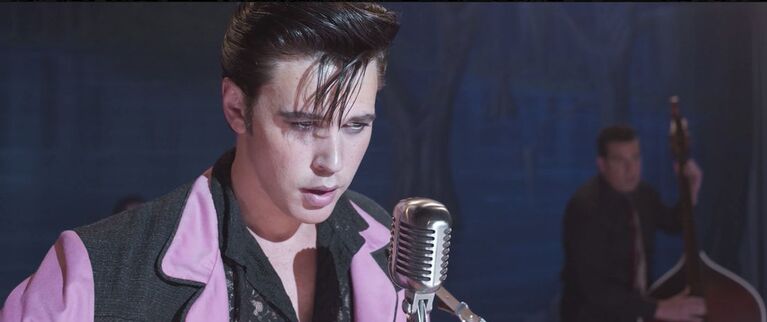ELVIS
****
Director: Baz Luhrmann
Screenplay: Baz Luhrmann & Sam Bromell and Baz Luhrmann & Craig Pearce and Jeremy Doner, story by Baz Luhrmann and Jeremy Doner.
Principal cast:
Austin Butler
Tom Hanks
Olivia DeJonge
Helen Thomson
Richard Roxburgh
David Wenham
Country: Australia/USA
Classification: M
Runtime: 159 mins.
Australian release date: 23 June 2022.
"When I was a child, Ladies and Gentlemen, I was a dreamer" - Elvis. 1971
Director Baz Luhrmann could never be accused of doing anything by halves. In all their film works, he and his life and work partner, production designer Catherine Martin, have taken a larger-than-life approach to their subjects and applied it with pizzazz and buckets of style. Now, they’ve brought their signature look to the life of the late, great singer and performer Elvis Presley in Elvis - and, once again, it’s a tactic that’s paid off spectacularly. They’ve successfully taken the biography of a rock’n’roll star whose career began in the early Fifties and ended in the Seventies and made it relevant and highly accessible to current-day audiences, both visually and musically. There’s nothing dated about this Elvis. I suspect Luhrmann has also made a bona fide worldwide star of the film’s lead actor, Austin Butler, who gives a remarkable performance as Presley; it’s not an homage, he embodies the singer, so much so that you forget you’re not looking at the real thing. He’s Oscar-worthy.
Filmed in Australia on the Gold Coast with an almost entirely Australian cast, Elvis begins in Las Vegas in 1973 as a semi-delirious Colonel Tom Parker (a bravura Tom Hanks), Presley’s manager, relates the tale of how he spotted the singer’s extraordinary talent at a fair in the American South. Parker was a carnival barker who didn’t have an ear for music but he knew what sold and he was flabbergasted by the effect Elvis had on the young women in the audience that night. As he says in the movie, “It was the greatest carnival act I had ever seen.” Presley was a rookie kid from an impoverished background, so it didn’t take much for the Colonel to convince him that he should allow Parker to manage his career exclusively and soon he was on a meteoric rise to national fame, taking his beloved mother (Helen Thomson), father (Richard Roxburgh) and posse of mates along for the ride. The Fifties were still extremely conservative, however, and before long this “white boy with black hips” was causing controversy wherever he performed. Threatened with jail by the authorities for offending public decency, he was left with no choice but to enlist in the army and was sent to Germany for two years, where he met his future wife, Priscilla (Olivia DeJonge), the daughter of a US Navy pilot. Returning to the USA after his tour of duty was over, the manipulative Colonel once again sunk his claws into the young man and took his career into new directions, ones that caused the singer considerable distress and would have a significant negative effect on his life.
It goes without saying that Elvis looks and sounds fabulous. Luhrmann often employs rapid-fire editing techniques to convey his plotlines and he’s done it again here. In the early part of the film, as Parker tells of his meeting with Presley, we are treated to a lengthy montage of scenes from Elvis’ childhood, growing up with African-American friends in a world of tent preachers and juke joints, listening to gospel and blues and absorbing these disparate influences from the sacred to the profane. It’s an exciting shorthand way of telling the audience just how this kid developed such an amazing talent and it’s augmented by an equivalent aural mash-up of those musical styles. It’s truly exciting and sets you up for the rest of the picture. Multi award-winning Australian DoP Mandy Walker is responsible for the cinematography and her camera rarely stops moving, which fits both the subject matter and Luhrmann’s jittery approach. The soundtrack is a very original compilation of styles, a seamless mix of rock’n’roll, blues, rap, gospel and other influences. Butler sings all of the early live performances himself (superbly) but, as his character matures, Presley’s and Butler’s voices have been melded into one, which works exceptionally well. Hanks’ accent takes some getting used to but eventually settles down (Parker, whose name wasn’t Parker, was a Dutch national who spent many years in the South) and this is an unusual role for the actor - “the villain of this here story” - but he brings his great skill to the character with aplomb.
Elvis is a film of which Luhrmann and Martin can be proud. It’s not perfect and could have done with a sharper edit in the mid-section but, for the most part, it’s a clever, vibrant retelling of the life of a singer who brought dramatic change to a nation crying out for it and who, for a relatively brief period, embodied all that was fresh and exciting about a brash, young country emerging onto the world stage after the rigours of World War II.
Screenplay: Baz Luhrmann & Sam Bromell and Baz Luhrmann & Craig Pearce and Jeremy Doner, story by Baz Luhrmann and Jeremy Doner.
Principal cast:
Austin Butler
Tom Hanks
Olivia DeJonge
Helen Thomson
Richard Roxburgh
David Wenham
Country: Australia/USA
Classification: M
Runtime: 159 mins.
Australian release date: 23 June 2022.
"When I was a child, Ladies and Gentlemen, I was a dreamer" - Elvis. 1971
Director Baz Luhrmann could never be accused of doing anything by halves. In all their film works, he and his life and work partner, production designer Catherine Martin, have taken a larger-than-life approach to their subjects and applied it with pizzazz and buckets of style. Now, they’ve brought their signature look to the life of the late, great singer and performer Elvis Presley in Elvis - and, once again, it’s a tactic that’s paid off spectacularly. They’ve successfully taken the biography of a rock’n’roll star whose career began in the early Fifties and ended in the Seventies and made it relevant and highly accessible to current-day audiences, both visually and musically. There’s nothing dated about this Elvis. I suspect Luhrmann has also made a bona fide worldwide star of the film’s lead actor, Austin Butler, who gives a remarkable performance as Presley; it’s not an homage, he embodies the singer, so much so that you forget you’re not looking at the real thing. He’s Oscar-worthy.
Filmed in Australia on the Gold Coast with an almost entirely Australian cast, Elvis begins in Las Vegas in 1973 as a semi-delirious Colonel Tom Parker (a bravura Tom Hanks), Presley’s manager, relates the tale of how he spotted the singer’s extraordinary talent at a fair in the American South. Parker was a carnival barker who didn’t have an ear for music but he knew what sold and he was flabbergasted by the effect Elvis had on the young women in the audience that night. As he says in the movie, “It was the greatest carnival act I had ever seen.” Presley was a rookie kid from an impoverished background, so it didn’t take much for the Colonel to convince him that he should allow Parker to manage his career exclusively and soon he was on a meteoric rise to national fame, taking his beloved mother (Helen Thomson), father (Richard Roxburgh) and posse of mates along for the ride. The Fifties were still extremely conservative, however, and before long this “white boy with black hips” was causing controversy wherever he performed. Threatened with jail by the authorities for offending public decency, he was left with no choice but to enlist in the army and was sent to Germany for two years, where he met his future wife, Priscilla (Olivia DeJonge), the daughter of a US Navy pilot. Returning to the USA after his tour of duty was over, the manipulative Colonel once again sunk his claws into the young man and took his career into new directions, ones that caused the singer considerable distress and would have a significant negative effect on his life.
It goes without saying that Elvis looks and sounds fabulous. Luhrmann often employs rapid-fire editing techniques to convey his plotlines and he’s done it again here. In the early part of the film, as Parker tells of his meeting with Presley, we are treated to a lengthy montage of scenes from Elvis’ childhood, growing up with African-American friends in a world of tent preachers and juke joints, listening to gospel and blues and absorbing these disparate influences from the sacred to the profane. It’s an exciting shorthand way of telling the audience just how this kid developed such an amazing talent and it’s augmented by an equivalent aural mash-up of those musical styles. It’s truly exciting and sets you up for the rest of the picture. Multi award-winning Australian DoP Mandy Walker is responsible for the cinematography and her camera rarely stops moving, which fits both the subject matter and Luhrmann’s jittery approach. The soundtrack is a very original compilation of styles, a seamless mix of rock’n’roll, blues, rap, gospel and other influences. Butler sings all of the early live performances himself (superbly) but, as his character matures, Presley’s and Butler’s voices have been melded into one, which works exceptionally well. Hanks’ accent takes some getting used to but eventually settles down (Parker, whose name wasn’t Parker, was a Dutch national who spent many years in the South) and this is an unusual role for the actor - “the villain of this here story” - but he brings his great skill to the character with aplomb.
Elvis is a film of which Luhrmann and Martin can be proud. It’s not perfect and could have done with a sharper edit in the mid-section but, for the most part, it’s a clever, vibrant retelling of the life of a singer who brought dramatic change to a nation crying out for it and who, for a relatively brief period, embodied all that was fresh and exciting about a brash, young country emerging onto the world stage after the rigours of World War II.

